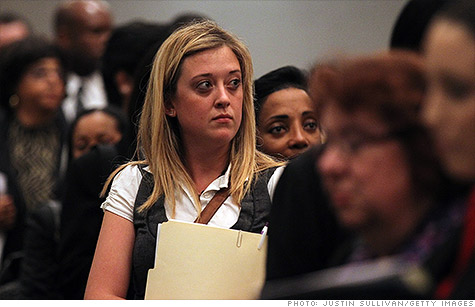Search News

Over 5 million Americans have been out of work for more than six months.
NEW YORK (CNNMoney) -- The national unemployment rate has fallen from its recession highs, but Americans who have been out of work for six months or more are still having trouble finding work.
The numbers are staggering. The ranks of the long-term unemployed swelled last month from 5.1 million to 5.4 million, and those individuals now account for 42.8% of the unemployed.
Meanwhile, the average length of time the unemployed have spent out of work has climbed steadily higher -- and older Americans have been the hardest hit.
"The result is nothing short of a national emergency," economists Dean Baker and Kevin Hassett wrote recently in the New York Times.
"Millions of workers have been disconnected from the work force, and possibly even from society. If they are not reconnected, the costs to them and to society will be grim," the economists said.
Congress and state legislators have tried all manner of programs to ease the plight of the long-term unemployed, and some have succeeded around the margins.
But four and half years after the recession, long-term unemployment still ranks as one of the economy's most pressing problems.
The issue is so endemic that economists are now debating whether it will result in a permanent jump in the unemployment rate.
Economists fall into two basic camps. Some think elevated unemployment is a structural problem -- or one likely to persist despite continued economic growth.
This implies a mismatch between the jobs employers are offering and the skills of the unemployed -- and a less obvious path back to a low unemployment rate.
But others believe the current unemployment problem is due to slack demand and therefore cyclical. Federal Reserve Chairman Ben Bernanke and his lieutenant Janet Yellen are in this camp.
"While the magnitude of structural unemployment is uncertain, I read the evidence as suggesting that the bulk of the rise during the recession was cyclical, not structural in nature," Yellen said last week.
Of course, as Yellen suggests, it is quite possible that both structural and cyclical factors are feeding into the plight of the long-term unemployed.
Still, the fact that economists are unable to agree on why the labor market has been so slow to recover suggests that no policy solution will be immediately forthcoming.
Even as little progress is made, Congress and state legislators have enacted laws making it more difficult for chronically out of work individuals to collect unemployment insurance.
More than a half million of the long-term unemployed are losing their federal extended unemployment benefits in the coming months.
The federal extended benefits program has provided the jobless with up to 20 weeks of unemployment checks after they've run through their state and their federal emergency benefits, which together last up to 79 weeks.
But the extended benefits program is expiring throughout the country as the economy improves.
To be eligible for these payments, a state must show that its unemployment rate is at least 10% higher than it was in at least one of the past three years.
And state unemployment rates have been dropping as the jobless find new positions or exit the workforce.
Some of those who lose benefits will continue to look for jobs and be included in the unemployment rate. Others will take whatever they can get, which will put them in the "employed" category.
But others will just drop out of workforce entirely. Some may go back to school, while some will retire earlier than planned.
The scaling back of benefits has long been a priority of congressional Republicans, who worry that extended benefits are creating an dependency on government help and prolonged joblessness.
Democrats argue that unemployment benefits are an effective stimulus measure, as the money is often pumped directly into the economy in the form of consumer spending.
Baker and Hassett, the economists, argue that policymakers must recognize that long-term unemployment is a crisis, and craft a bipartisan plan to expand training plans and small business financing, reduce government red tape, and explore subsidies to expand hiring.
"Every month of delay is a month in which our unemployed friends and neighbors drift further away," they said.
| Overnight Avg Rate | Latest | Change | Last Week |
|---|---|---|---|
| 30 yr fixed | 3.80% | 3.88% | |
| 15 yr fixed | 3.20% | 3.23% | |
| 5/1 ARM | 3.84% | 3.88% | |
| 30 yr refi | 3.82% | 3.93% | |
| 15 yr refi | 3.20% | 3.23% |
Today's featured rates:
| Latest Report | Next Update |
|---|---|
| Home prices | Aug 28 |
| Consumer confidence | Aug 28 |
| GDP | Aug 29 |
| Manufacturing (ISM) | Sept 4 |
| Jobs | Sept 7 |
| Inflation (CPI) | Sept 14 |
| Retail sales | Sept 14 |